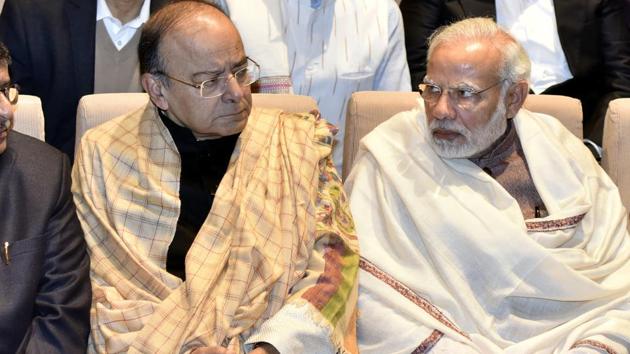Fight between PM Modi and ‘anarchist combination’ of Opposition parties: Jaitley
The NDA government, led by Prime Minister Narendra Modi, turned four on Saturday. Jaitley said this year marks the consolidation of the policies and programmes which have been implemented.
Union minister Arun Jaitley on Saturday slammed the prospect of coming together of various opposition parties a year before the general elections, calling the federal front a “failed idea”.

He also said that the political agenda for the debate this year would be “Modi versus an anarchist combination”.
In a write-up on the fourth anniversary of the National Democratic Alliance (NDA) government, Jaitley said the last few days have witnessed a discussion about a “fictional alternative”, and a group of “disparate” political parties are promising to come together. “Some of their leaders are temperamental, the others occasionally change ideological positions,” he wrote in a Facebook post on Saturday. “Some leaders are maverick and others include those who are either convicted or charged with serious allegations of corruption.”
Jaitley named parties such as the Trinamool Congress (TMC), Dravida Munnetra Kazhagam (DMK), Telugu Desam Party, Janata Dal (Secular) and the Bahujan Samaj Party (BSP), with whom the Bharatiya Janata Party (BJP) has shared power in the past, and said they frequently change political positions by supporting the BJP in the name of national interest and opposing it in the name of secularism.
“These are ideologically flexible political groups. Stable politics is far from their political track record. Some amongst this disparate group have an extremely dubious track record of governance,” he said.
The senior BJP leader said the political support base of many of the opposition parties is confined to either a few districts or to a particular caste. Jaitley argued that ruling a large country like India was possible through coalition, but that the nucleus of such a coalition has to be stable. “It must have a large size, an ideologically defined position and a vested interest in honest governance.”
He referred to the 1996-1998 period to argue that “such a front with its contradictions, sooner or later, loses its balance and equilibrium”. “...the aspirational India which today occupies the high table in the world shall never accept an idea which has repeatedly failed. History teaches us this lesson. Aspirational societies with vibrant democracies do not invite anarchy,” he wrote.
The 2014 polls, he said, “conclusively established that in the New India chemistry will score over arithmetic when it comes to deciding the country’s destiny”.
The minister said the fifth year of the Modi government will be the “year of consolidation of the policies and programmes which we have implemented”.
He called the PM “a strong leader with a mass appeal”, and argued that “his insistence on integrity, his infatigable capacity to work, his clarity of policy and direction, his boldness in taking steps in larger national interest gives the NDA a natural political advantage”. “Clarity and credibility are hallmarks of the NDA Government.”
“Good governance and good economics have been blended with good politics. The result of this has been that the BJP is more confident, its geographical base has become much bigger, its social base has expanded and its winnability has hugely increased,” he said.
Attacking the Congress, Jaitley said the party “is in desperation without the perks of office”.
“From the dominant party of Indian politics, it is moving towards the ‘fringe’, its political positions are not of a mainstream party but one usually adopted by ‘fringe’ organisations. Fringe organisations can never hope to come in power,” he added.
“Its best hope lies in becoming a supporter of regional political parties. State level regional political parties have realised that the marginalised Congress can at best be either a junior partner or a marginal supporter,” he said.






